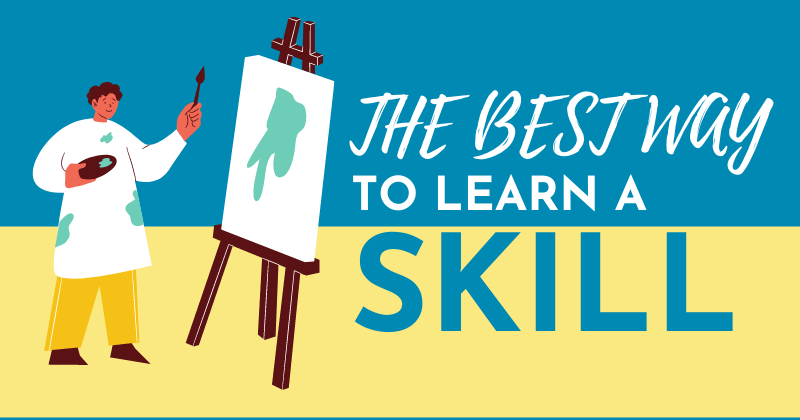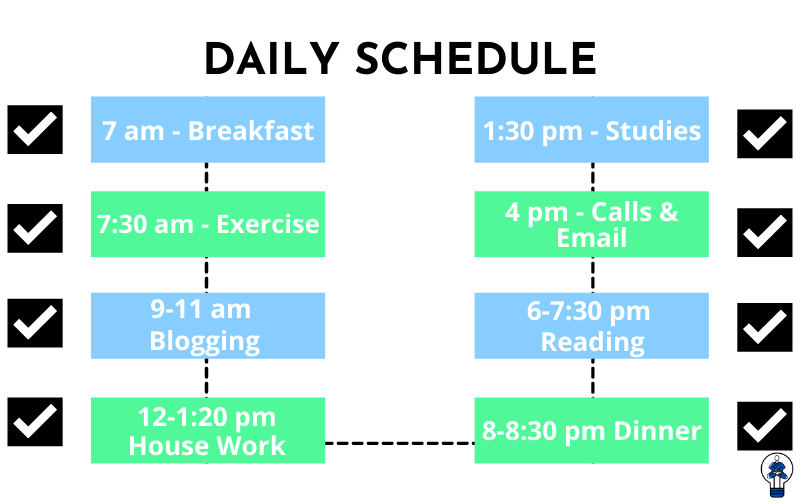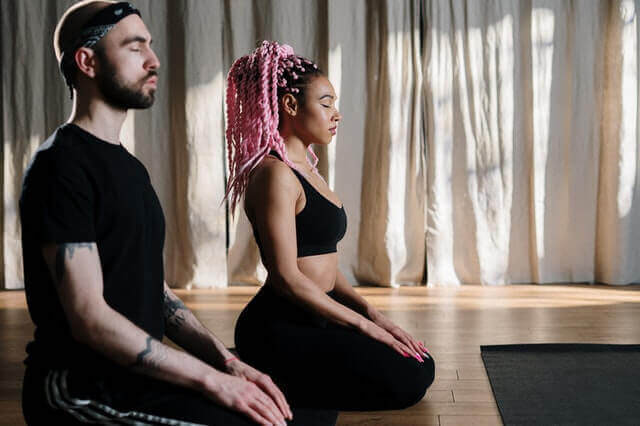The Best Way To Learn A New Skill (Faster) In 2024!

This article may contain affiliate links. If you make a purchase using my links, I’ll earn a small commission at no extra cost to you. I appreciate your support!
Don’t you want to get good at everything? I want to get good at a lot of things like getting better at singing (I practically suck at singing!). I also want to be a better cook, a better listener and of course a better financial expert and a much more productive person.
But trying to find time to learn these skills is tough and let’s be honest, we don’t really have that much time in a day!
So after doing tons of research online, I’ve compiled an article that will best serve the purpose of learning a new skill in the fastest most efficient way possible.
Why is it so hard to learn new skills?
If a student or an employee has difficulty learning a skill or concept, what do they do? They Quit! Everybody likes the easier path in life and most of the time the easy path is to quit, to give up and to relax on the couch while watching Grey’s Anatomy.
But it doesn’t have to be that way. With the right techniques, a few hours each week and a pinch of optimism, learning any skill will be as easy as asking a girl out for a date night on Friday (okayyy…maybe slightly easier than that).
The early hours of something new is always a challenge, but by not giving up in those early stages, you are setting yourself up for massive success.
Major Barriers For Learning New Skills

1. Not setting clear & definitive goals
This is the most obvious barrier to learning with speed. You don’t have goals set in place, you don’t know what exactly you want to learn.
Try being a little more specific with what you are trying to do; the motivation to learn the new skill will kick right in.
For example, I like cooking so I want to learn to cook. If I start cooking random recipes every day (because my goal is to learn cooking), I’ll either get bored after a few recipes or I’ll lack the motivation to practice (mainly due to no focus).
So here’s what I’ll do now, I’ll narrow down ‘cooking’ by thinking about what exactly do I like cooking. I love Indian food but I want to learn Japanese and Mexican cuisine.
Now I have two cuisines to learn so I’ll only search for recipes in that cuisine and cook accordingly. Once in a while, I’ll try a whole new cuisine just for fun but I’ll stick to these two till I become good at it.
Once I’m good at it, I’ll either learn a whole new skill or I’ll pick two more cuisines and start cooking.
2. Learning new skills is time-consuming
It takes time to learn a skill. You won’t achieve success in just a few hours (unless you’re Barry Allen – The Flash). Most often people assume they’ll learn the new skill in a few days, so they are motivated for those few days.
When that doesn’t happen, they get demotivated and quit learning the skill. We all want to learn skills fast, you need to accept the fact that learning takes time and enjoy the process instead of regretting it.
3.Learning new skills is intimidating
Do you like to fail? I know I don’t! But when you’re learning new skills, it’s natural to not understand the process.
You don’t know what you don’t know. It’s baseless trying to get frustrated by the fact that you don’t know anything.
Let me make it clear when you start learning a new skill YOU WILL BE PATHETIC AT IT.
You’re new at this, once you know more about the skill, you’ll get better and words like frustration and intimidation will be words of the past.
How to Find Time to Learn Your New Skill
While the advantages of learning a new skill are crystal clear, we often can’t find the time to learn our skill. Before I share with you my top 4 tips to make time, I want to make it very clear that you always have time with you.
No one is busy 24×7. It’s just not possible. The truth is that everyone has some time to spare, but we prioritize that time to do something else thus pushing away our time to learn a new skill. Now let’s go over the best tips to manage your time.
Top Tips to Find Time To learn Your New Skill
1. Track Your Schedule
You better know how you spend your day. Right from the first task in the morning to the last task of the day right before saying good night to your girlfriend.
Write down all the tasks along with time slots for each task. This will help you analyse free time lots and make changes in your timetable.

Look at my schedule, you can easily spot a few time gaps that are free like from 11 am to 12 pm or from 7:30 pm to 8 pm and even after 8:30 pm I sleep at 10:30). So I do have a lot of time if I really want to learn a new skill.
All I have to do is use these time gaps and fill them with my skill. When you keep track of your time, you will be surprised to see the amount of free time you have every day.
2. Wake Up 30 Min Early
I love to sleep, so I understand your pain but you’re probably sleeping too much. It’s time to reduce that sleep to make some more time to develop a new skill.
That 30 minutes you get early in the morning can prove to be extremely valuable, if done consistently.
To make sure you get good sleep at night, keep the room dark, reduce the room temperature, and stay away from any electronics 30 minutes before you sleep.
3. Eliminate Distractions/Isolate Yourself
Why do people prefer studying or working in a library over any other place? Because it’s quiet and has absolutely no distractions.
It’s the perfect place to free yourself from all the people who love to distract you. If you don’t have a library nearby, find a location or a room that isn’t too noisy so you can work with full focus and thus gain maximum results in minimum time.
4. Work With Full Focus
Instead of taking seven hours to write an article, what if it took me five hours? Will I get two additional hours to do something else?
You bet I would! This tip stresses on you focusing on the job upfront. If you’re writing emails to apply for a new job and you have allotted 1 hour for it, try your best to get it done in less time.
The excess time you create can be utilized for something else, like practising your new skill.
How Long Does It Take To Learn A Skill?
How many hours do you need to learn a skill? Well, It boils down to how fast you are at learning a new skill combined with how interested you are to learn that skill.
But if you want a specific number, Josh Kaufman, the author of The First 20 Hours says that it takes 20 hours to learn a skill to the point of being reasonably proficient in it.
This doesn’t mean you’ll be able to teach your newly acquired skill, it just means you’ll be reasonably proficient, which is a good thing.
My Top Strategies To Learn A New Skill (Fastest Way)
1. Practice Practice and Practice

This is a no brainer. If you want to learn something then the best most practical and logical way to learn it is by practising.
Practising is obvious but if you are practising the sub-skills you already know well, you aren’t going to make substantial progress.
To make real progress, drive your energy to learn new sub-skills, keep practising it till you don’t get the same feeling you do when you brush your teeth when still asleep.
To excel at any skill, you need to throw yourself out there, you need to touch the boundaries, focus and practice the things you aren’t good at. This is known as deliberate practising.
By building long term practice habits, you are set to do more and learn faster. On the internet, I am sure you will find bloggers and YouTubers sharing shortcuts for acquiring a new skill.
While they may work in the short-run (cause they are short-cuts…hahaha), you will soon lose touch or get back to square one.
Moral of the story – There is no substitute for Practice.
2. Learn By Listening
How did you learn those tough geometry and algebra sums? You heard your teacher teaching it to you right. So learning by listening is a great way to boost the speed of learning.
The more you listen, the better off you’ll be when you practice the skill, because now you know how to go about it and you only need to execute.
So if you want to be a gamer, spend time watching gameplays, if you want to be a better cook, watch youtube videos, watch your parents cooking, listen to what everyone says and learn from it.
But don’t just listen because listening helps to learn. Bring up your analytical side and observe what’s happening in the context.
If you want to be a movie producer, watch more movies; keep in mind that you are trying to understand how the scenes were shot, how the backdrop was staged, how the graphics were inserted without causing any scene disturbance.
Focus on observing the minute details while listening to the other person; this way learning a new skill will not be so difficult.
3. Get The Fundamentals Correct
Understand the backend completely. You need to know how things move, what happens when you do X and what happens when you don’t do Y.
So in our cooking example, we learn about the logic of cooking like how much protein does chicken have, how much fat it has, is chicken breast softer than chicken thighs. Understanding those concepts will help you learn recipes fairly easily.
Let’s take another example, if you don’t know the basic strings of guitar perfectly (nearly perfect) then playing songs won’t be easy.
You’ll soon end up making mistakes that you won’t understand because you never learnt all the strings in the first place. Take some time to learn the fundamentals, practice it again and again, then move on to higher levels.
This strategy is time-consuming but it sets a good foundation that you need while learning a new skill.
4. Intention: Why Are You Interested In Learning The Skill
A strong intention will get you to learn the skill faster. The most common problem faced is a lack of motivation to continue to work on your goals.
If you have a strong intention, learning your skills gets easier. Find your why, find out what motivates you; if nothing motivates you, then find your motivation.
Anyone can start learning a new skill, but not everyone can consistently learn a new skill. To learn a skill you need consistency and to maintain consistency, you need motivation.
Maybe it’s journaling your progress or setting goals with your friends or maybe it’s meeting around like-minded individuals.
5. Deconstruct The Skill You Want To Learn

Take any book as an example, your college books, fiction books, motivational success books or financial books, they always have an index that breaks down the content of the book into smaller sized information.
One book may contain 15 chapters, these 15 chapters are further broken down into 20 subchapters. Why do they do this?
Is it because deconstructing a book into smaller portions is easier for the publisher? Naaa, it’s because we humans can absorb information when it’s broken down into smaller portions.
Take another example, you eat food, right? Do you gulp everything that’s on your plate in one go or do you eat in small spoon sized portions? I hope you get the connection.
Similarly, by breaking down your primary skill into various sub-skills, your brain learns blocks of information that it clubs together, thus making the process of learning your skill efficient.
6. Setting Slightly Challenging Targets
Have you ever tried Cold Showers? It’s the ultimate test for overcoming challenges in your day to day life. Don’t believe me, try it out yourself.
Whenever your next shower appointment is scheduled (I hope it’s at least once a day), try taking a bath with cold water. Doesn’t matter if it’s your first time or if it’s the 113th time, taking cold showers rarely gets easy.
It’s always a challenge for those initial seconds. But at least after a few tries, your body gets ready to face the coolness and it reduces fear.
Use the same logic to learn a new skill, take up a challenging task and don’t give up till you get it right. Maybe that’s Gordan Ramsey’s most difficult dish or learning the most difficult language in the world – Mandarin.
The more you accept the fact that challenges will shape your skills in a faster, much better way, the easier it will be for you to adapt to new challenges along your skill learning journey.
7. Try New Things
By putting yourself in a position to try new things, you are training yourself to learn faster. You have to try out new things, take on some risk, involve yourself in something fun, something thrilling, something you’ve never done before and try learning it.
There’s a high probability you’ll not get the results you expected but by trying out different things, you are boosting your brain with input that you want to learn skills, so it does just that.
Bonus Tip: Imitate The Master

You might have an inspirational guru you found out on the internet. You always dream of being like him or her. I want you to closely observe their work and imitate it to the best of your abilities.
Now imitating someone doesn’t mean copying. You are not copying their original ideas, you are just analyzing their work and trying to do it yourself to improve yourself faster.
As long as you don’t take credit for that and give credit to the person from whom you learned the new technique, you should be fine.
If you have a coach or a tutor to teach you these skills, awesome! Getting a coach or a tutor is not necessary but it will surely speed up your process in developing the necessary skill sets.
If you don’t have great teachers in your vicinity, don’t let it stop you from learning your skills. You could always take up online courses.
There are over thousands of coaches online that have courses that teach you to master your skill in the shortest time possible.
Does Confidence Play A Role In Learning A Skill?
It’s utterly obvious that confidence matters. By not being confident, you’re risking yourself from not being one of the best or at least noticeable in front of a large crowd.
According to a study that measured the role of confidence in learning, they found out that respondents who were confident showcased consistent improvements in their learning outcomes.
Honestly, we didn’t need a study to prove that point, right! Of course, confidence boosts performance every single time. If you are confident about learning a certain skill, its natural you’ll do better from the get-go
If you need to build on some confidence, here’s my article covering 16 ways to boost your confidence.
How To Not Fall Asleep When Learning Something New
Falling asleep when working on a skill is common I suppose (I do feel sleepy and lazy if I’m doing something I don’t really like). That’s why regaining focus is very important. These 4 tips should help you do just that.
Tip 1: Pick An Interesting Skill
If the skill you choose doesn’t interest you, it will surely bore you. Once that happens, every time you start working on those skills, you will tend to fall asleep.
When choosing a skill to learn, don’t choose a skill-based on other peoples opinion, you will regret it, instead figure out what interests you and act accordingly.
Tip 2: Take A 15 Minute Nap
Aren’t we talking about avoiding sleep? Ummmm? Yea we are but here’s the fact. Avoiding sleep every time is not a good practice.
So take a 10-15 minute nap before getting started and see the difference. This will improve focus, I’ve tested it for 365 days a year.
Tip 3: Practice In A Bright Room
An important factor to create a sleepy atmosphere is shutting off all lights and making your room dark.
So to avoid being sleepy, switch on as many lights as you can in your room. This will throw away the sleep and give you the focus time you need to practice your skill.
Tip 4: Eat A Banana (proved to be an energy food)
Banana is a good source of complex carbs, potassium, and vitamin B6, all of which can help boost your energy levels. If you hate bananas in general, try dates or coffee or dark chocolate.
Is It Necessary To Master All The Skills You Learn?
Mastering a skill takes time, a lot of time. You don’t have to master all those skills, it’s simply not worth it!
I love food and I always wanted to learn to cook and now I do learn to cook but I’m surely not looking forward to being the next Masterchef.
The real output must be to practice the skill to such a level where you can use it when necessary without too much hesitation and discomfort. It’s important to master those skills that interest you the most because when you are naturally interested in something, you will learn it with much ease and save time in the process.
Try to get basic education of about 90% of the skills you want to learn and master 10% of the skills you truly want to master.
Speed Skill Learning
Whatever you want to learn, be it cooking Japanese cuisine or martial arts, kung fu or a new language, simply make a plan for implementing it and get started. Use the guidelines I’ve shared with you and focus on prioritizing your tasks according to these guidelines.
There is no perfect time for you to start your skill-learning journey. You can make the perfect plan, buy the best of things, and get mentally and physically ready but none of that will truly accelerate your skill-learning process.
Your efforts will, along with when you start learning, determine how fast you learn. The best time to start learning any skill on planet Earth is today.
You don’t need flashy expensive cameras to start youtube just like you don’t need a MacBook Pro to learn graphic designing.
Of course, these things do matter, but only after you make money from your skills.
Then spend money to buy the expensive things and make yourself look cooler (if that’s what you want). Your initial investment in learning any skill should be your time, not your money.
Here’s the mantra I’ll give you – Learn from the best people in the industry, break it down into bite-sized sub-skills, and then practice. That’s it.
Here’s another mantra I want you to remember – Think big, start small but start today.
If you have any questions, let me help you in the comments below!
Have you enjoyed this post? If so, you might want to subscribe to my newsletter. It usually contains life lessons and money-related topics, some interesting observations, links to articles or books I’ve read, and tips to be a better person. If you’re interested in these things then subscribing will be simply wonderful 🙂 PS: Subscribe and Get your Freebie below!
Also, I’m a YouTuber now! If you’re interested in Pinterest Marketing, Blogging, or business-related things, Subscribe to my Channel and I’ll see you in the comments!